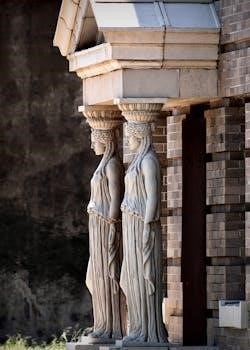
corpus hermeticum pdf
The Corpus Hermeticum is a collection of ancient texts attributed to Hermes Trismegistus. These writings, foundational to the Hermetic tradition, explore philosophical and theological concepts. Many seek PDF versions for ease of access and study.
Overview of the Corpus Hermeticum
The Corpus Hermeticum, a collection of texts attributed to the mythical Hermes Trismegistus, serves as a cornerstone of Hermeticism. These writings, often sought in PDF format for convenient access, delve into a unique blend of philosophy, theology, and cosmology. The corpus comprises a variety of treatises, dialogues, and revelations, offering insights into the nature of God, the universe, and humanity’s place within it. Readers often explore these texts to understand ancient esoteric wisdom. The core themes revolve around spiritual transformation, the interconnectedness of all things, and the pursuit of gnosis. The availability of PDF versions allows for wider dissemination and study of these profound works, making them accessible to both scholars and spiritual seekers. The texts are seen as foundational for those interested in Western esotericism and ancient wisdom traditions, and many translations and editions exist.

Content and Themes
The Corpus Hermeticum explores core doctrines, cosmology, and humanity’s nature. It delves into spiritual transformation and immortality. PDF versions aid in accessing these complex themes.
Core Doctrines of Hermeticism
Hermeticism, as revealed in the Corpus Hermeticum, presents a unique set of doctrines. Central is the concept of “All is One,” emphasizing the interconnectedness of everything in the universe. The divine is seen as a transcendent yet immanent force, present in all creation. Another core belief involves the potential for humanity to achieve gnosis, a form of divine knowledge that leads to spiritual transformation and union with the divine. Furthermore, Hermeticism posits that the material world is a reflection of the divine realm, and through understanding this relationship, individuals can ascend spiritually. The texts often explore the nature of mind, consciousness, and their role in shaping reality. The emphasis is on personal experience and inner transformation as the path to enlightenment, not dogma. These doctrines are explored in depth within the available PDF versions.
Cosmology and Creation
The Corpus Hermeticum outlines a distinct cosmology and creation narrative. The texts describe a universe emanating from a singular divine source, often referred to as the “One” or the “Mind.” This initial divine act of creation is not a violent or external event but rather an emanation or unfolding of divine intelligence. The cosmos is viewed as a living entity, imbued with divine consciousness and order. This order is reflected in the relationship between the celestial and terrestrial realms, mirroring the divine plan. The creation of humanity is a significant aspect of this cosmology, positioning humans as beings capable of understanding and participating in the divine order. The available PDF versions detail the intricacies of this cosmic view, emphasizing the interconnectedness of all aspects of existence. The creation story also includes the concept of the divine ‘word’ as a creative force.
Nature of Humanity
The Corpus Hermeticum portrays humanity as having a unique and pivotal place within the cosmos. Humans are seen as possessing both a material body and a divine spirit. This duality positions them as intermediaries between the earthly and the divine realms. The texts emphasize that humans are capable of spiritual ascent and achieving a state of gnosis or divine knowledge. However, they are also prone to ignorance and attachment to material desires. This human condition is seen as a fall from grace, a forgetting of their true divine nature. The available PDF documents explore these ideas in detail, highlighting the potential for humans to transcend their limitations and attain a higher state of being. The Hermetic view of humanity emphasizes the importance of self-knowledge and the purification of the soul. The journey towards enlightenment is a key theme.
Spiritual Transformation and Immortality
The Corpus Hermeticum, often accessed through PDF versions, emphasizes the possibility of spiritual transformation and the attainment of immortality. These texts propose that humans, through gnosis and self-knowledge, can transcend their mortal limitations. This transformation is not a mere physical resurrection, but a profound shift in consciousness. It involves the purification of the soul and the awakening to one’s divine nature. The Hermetic view of immortality is not about escaping death, but about achieving a state of being where one is no longer bound by the cycle of birth and death. This process requires dedication, introspection, and a deep understanding of the Hermetic principles. The PDF resources often contain detailed explanations of the practices and beliefs associated with this transformative journey, including the idea of the soul being freed from its material attachments.

Historical Context
The Corpus Hermeticum’s origins are debated, with texts likely dating from early Christian era. Originally, scholars mistakenly dated them much earlier. PDF versions aid in studying this history.
Origins and Dating of the Texts
The precise origins and dating of the texts comprising the Corpus Hermeticum remain a subject of scholarly discussion. While attributed to the mythical Hermes Trismegistus, these writings are believed to have emerged from the cultural melting pot of Hellenistic Egypt. The texts are thought to have been composed between the 1st and 3rd centuries CE, a period marked by a vibrant exchange of Greek, Egyptian, and other Near Eastern religious and philosophical ideas. This era saw a flourishing of syncretism, where different traditions intertwined, shaping the unique character of Hermetic thought. The initial dating of these texts was inaccurate, with many believing them to be much older. The availability of the Corpus Hermeticum in PDF format allows for easier scrutiny and analysis of these complex historical questions by a wider audience. The study of these texts continues to shed light on the intellectual landscape of late antiquity and its influences on subsequent generations.
Mistaken Historical Dating
The Corpus Hermeticum was, for a considerable time, mistakenly dated to an era far earlier than its actual period of composition. This misconception, which persisted well into the Renaissance, played a crucial role in the texts’ reception and influence. Initially, these writings were believed to be remnants of an ancient Egyptian wisdom tradition, predating even the classical Greek philosophers. This erroneous dating, attributed to Church officials and others, led to the texts being viewed as a source of profound and primordial knowledge. This perceived antiquity lent them considerable authority, influencing Renaissance thinkers and artists. The later discovery of their actual Hellenistic origins led to a re-evaluation of their place in intellectual history. The availability of the Corpus Hermeticum in PDF format helps modern scholars re-examine this historical context, leading to a more accurate understanding of their genesis and impact, challenging previous assumptions about their age.
The Hermetic Tradition
The Hermetic tradition, deeply rooted in the Corpus Hermeticum, encompasses a rich tapestry of philosophical, religious, and spiritual ideas. It is characterized by a focus on the interconnectedness of all things, the divine nature of humanity, and the possibility of spiritual transformation. The tradition emphasizes the importance of knowledge, both of the cosmos and of oneself, as paths toward enlightenment. Hermeticism’s core doctrines, often explored through allegorical and symbolic language, have influenced various esoteric and occult movements throughout history. The accessibility of the Corpus Hermeticum in PDF format has significantly aided the study and perpetuation of this tradition. The tradition is characterized by its emphasis on the microcosm/macrocosm relationship, and the pursuit of gnosis, or direct spiritual knowledge, by means of inner work. It aims at the realization of ones divine potential and union with the source of all being.

Accessing the Corpus Hermeticum
Numerous PDF versions of the Corpus Hermeticum are readily available online, offering free access to various translations. These digital resources facilitate widespread study and deeper understanding of the texts.
Availability of PDF Versions
The digital age has made the Corpus Hermeticum remarkably accessible through numerous PDF versions. These files, often free of charge, allow researchers, students, and spiritual seekers to readily download and explore the ancient texts on their devices. Several online repositories host various translations, including those by G.R.S. Mead and Juan and Maria Balboa, catering to different preferences and research needs. Formats vary, with some being scanned copies of older editions and others being newly typeset. This widespread availability ensures that the wisdom contained within the Corpus Hermeticum can be easily accessed and studied by a global audience, fostering a deeper engagement with Hermetic philosophy. The ease of downloading these PDFs has significantly contributed to the continued relevance and study of these texts.
Translations and Editions
Numerous translations and editions of the Corpus Hermeticum exist, each offering a unique perspective on the original Greek texts. G.R.S. Mead’s translation is a classic, widely available in PDF format, often accompanied by his insightful introduction and notes. More recent translations, such as those by Juan and Maria Balboa, offer fresh interpretations. Additionally, some editions focus on specific texts within the Corpus, like the Poemandres. The availability of various translations in PDF format allows for comparative study and a deeper understanding of the Hermetic tradition. Different editions may also include textual variations and scholarly commentaries, enriching the reader’s experience. Choosing the right translation depends on individual preferences and research purposes.
Online Resources for Reading
The internet provides numerous resources for accessing and reading the Corpus Hermeticum, often in PDF format. Websites like the Internet Archive host digitized versions of various translations and editions. Many online libraries and repositories offer free downloads of the texts, making them easily accessible to researchers and enthusiasts. Some websites also provide online reading platforms, allowing users to read the texts directly within their browsers. These resources often include user reviews and ratings, aiding in the selection of appropriate translations. Online forums and communities dedicated to Hermeticism also provide valuable discussions and insights. These diverse online resources facilitate a deeper exploration of the Corpus Hermeticum for anyone with internet access.

Reception and Influence
The Corpus Hermeticum significantly impacted Renaissance thought and continues to inspire modern interpretations. The availability of PDF versions facilitates its ongoing study and relevance.
Impact on Renaissance Thought
The rediscovery of the Corpus Hermeticum during the Renaissance had a profound impact on intellectual and artistic circles. Believed to be ancient texts from Egypt, they were considered to predate even Plato, granting them immense authority. This led to a surge of interest in Hermetic philosophy, which emphasized the interconnectedness of the cosmos, the divine nature of humanity, and the possibility of spiritual transformation. Scholars, artists, and philosophers like Marsilio Ficino and Giordano Bruno were captivated by its ideas, integrating them into their own works. The Hermetic worldview offered an alternative to the dominant Aristotelian and scholastic traditions, contributing to the intellectual ferment of the era. The availability of these texts, even in manuscript form before the advent of the printing press, spurred a new wave of esoteric and philosophical exploration, influencing art, literature, and even scientific thought.
Modern Interpretations
The Corpus Hermeticum continues to be a subject of fascination and study in modern times. While its historical context and authorship are now better understood, its philosophical and spiritual teachings still resonate with many. Modern interpretations often explore the psychological, symbolic, and metaphorical dimensions of the texts, rather than focusing solely on their historical claims. Scholars and practitioners alike analyze the themes of self-transformation, the nature of consciousness, and the relationship between humanity and the divine. The availability of PDF versions and online resources has made the Corpus Hermeticum accessible to a wider audience, leading to diverse perspectives and applications. Some view it as a source of esoteric wisdom, while others approach it as a valuable piece of ancient philosophical literature. The adaptability of its ideas allows for continued exploration and relevance in contemporary spiritual and intellectual pursuits.